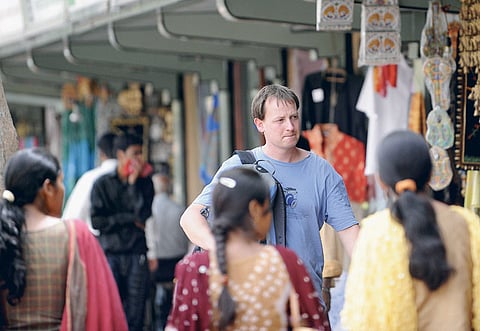How to be an ethical traveller
Join the global stream of responsible tourists

1 Spend wisely
Jeff Greenwald is the executive director of Ethical Traveler, a global community dedicated to exploring the ‘ambassadorial potential' of world travel. He advises travellers to patronise locally-owned inns, restaurants, and shops. "Try to keep your cash within the local economy, so the people you are visiting can benefit directly from your visit. Bargain fairly, and with respect for the seller. Consider the economic realities of where you are - the final transaction should leave both buyer and seller satisfied and pleased," says Greenwald.
2 Open the communication channels
The best tour guide is someone who lives in the place, knows everything about it, is proud of his or her city, but does not work for any agency, says author and intrepid explorer Paulo Coehlo in Like the Flowing River (HarperCollins). "Go out into the street, choose the person you want to talk to, and ask them something (Where is the cathedral? Where is the post office?). If nothing comes of it, try someone else - I guarantee that by the end of the day you will have found yourself an excellent companion." Greenwald says listening with respect is the essence of diplomacy, on both the personal and international levels, as much conflict is simply a result of people feeling marginalised.
3. Be politically aware
Read the political and historical sections of your travel guidebook and English-language newspapers, where they exist. For a quick profile of most countries, go to
www.ethicaltraveler.org.
4 Don't compare
Whether it's prices, standards of hygiene, quality of life, means of transport, make sure you only see it in its context and appreciate every aspect of the foreign culture. "You are not travelling in order to prove that you have a better life than other people. Your aim is to find out how other people live, what they can teach you, how they deal with reality and with the extraordinary," says Coelho.
5. Go green
Support airlines that are making efforts to reduce their carbon emissions, conserve water and avoid buying water in plastic. Set an example in the way you dispose of your rubbish and, if you use a tour company, try to choose one with a focus on sustainable /eco-friendly practices. Reduce your carbon footprint by spending your money on things you won’t need to carry: tickets to a good play, restaurants, trips.
6 Support community-based tourism
Stay in local homes, like those of Wanni Ruengsamut, one of 80 villagers on Koh Yao Noi who has embraced the small Thai island’s community-based tourism programme sparked by a conflict between small-scale fisherfolk who were losing their income to giant trawlers emptying the ocean. Wanni lets out two of her four rooms in her home. “I decided to join the programme after realising there is much that my family can get and that we can give and share with our guests,” says Wanni. “The programme is not just about visiting Koh Yao Noi and experiencing a bit of home-stay. Showing how we try to protect our natural resources and sharing our fishing community’s culture are also important.”
7 Walk or use public transport
Travel writer Eric Lucas says, “Travelling is often disastrous to exercise routines; the opportunity to walk to meetings, attractions, restaurants and activities is almost universal in major cities. It saves money, spares pollution, helps you live longer, and is by far the best way to experience any destination. When walking isn’t practical, public transport is the next best option. Buses, trams, trains and the like are available and convenient in hundreds of the world’s major cities. Often they are an intrinsic part of the experience: If you haven’t ridden the Tube, you haven’t been to London.”
8 Take the time to learn basic courtesy phrases
Before you leave for your destination, learn greetings, ‘please,' and ‘thank you.' Then use those airport hours to learn as many numbers as you can handle. "It's astonishing how far a little language goes towards creating a feeling of goodwill. Also, respect the local taboos and traditions of the country you are visiting. Never, for example, make ignorant mistakes like pat a Thai child on the head, enter a traditional Brahmin's kitchen, or refuse a cup of kava in Fiji," says Greenwald.
9 Give wisely
When it comes to issues of begging and giving in Third World countries, instead of giving gifts to children, give them to parents or teachers, and find out first whether they're really needed, says Greenwald. To his mind, the problem is more likely to have started by over-generous tourists rather than the impoverished locals themselves. "When the first tourists and trekkers visited these hamlets and were surrounded by raggedy children, lacking any other means of explaining themselves, they began doling out money and sweets. Such behaviour turns kids into beggars faster than you can say ‘one rupee' — as future travellers to those regions soon discovered."
10 seek out the unusual
Bulungula, a rustic eco-friendly lodge on South Africa's Wild Coast, sums up the essence of ethical travelling. Rated as one of the world's top 25 ethical travel destinations, Bulungula's major goal is to develop tourism entrepreneurs in the community. Solar power and sustainable energy initiatives here range from water tanks and compost toilets to rocket showers which produce sizzling hot water showers. Accommodation is in platformed tents and rondavels. Locals offer head massages, guided tours of the village, which include sangomas (witch doctors) and shebeens (bars), as well as sel bags and clothes sewn on the premises on old sewing machines. You can also accompany the women for a day, learning the correct way to carry a bucket on your head, make mud bricks and prepare dung hut floors. There are several such resorts around the world where you could plan your next break.



